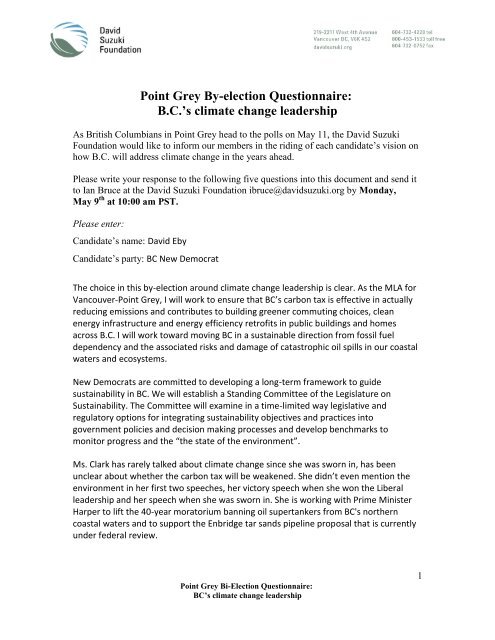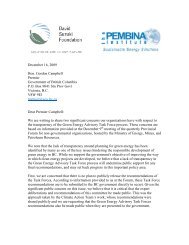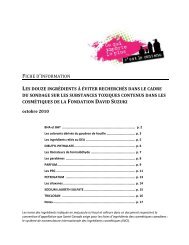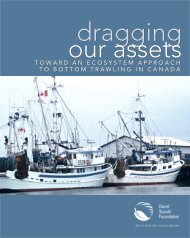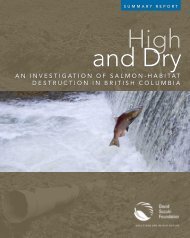Read - David Suzuki Foundation
Read - David Suzuki Foundation
Read - David Suzuki Foundation
Create successful ePaper yourself
Turn your PDF publications into a flip-book with our unique Google optimized e-Paper software.
Point Grey By-election Questionnaire:B.C.’s climate change leadershipAs British Columbians in Point Grey head to the polls on May 11, the <strong>David</strong> <strong>Suzuki</strong><strong>Foundation</strong> would like to inform our members in the riding of each candidate’s vision onhow B.C. will address climate change in the years ahead.Please write your response to the following five questions into this document and send itto Ian Bruce at the <strong>David</strong> <strong>Suzuki</strong> <strong>Foundation</strong> ibruce@davidsuzuki.org by Monday,May 9 th at 10:00 am PST.Please enter:Candidate’s name: <strong>David</strong> EbyCandidate’s party: BC New DemocratThe choice in this by-election around climate change leadership is clear. As the MLA forVancouver-Point Grey, I will work to ensure that BC’s carbon tax is effective in actuallyreducing emissions and contributes to building greener commuting choices, cleanenergy infrastructure and energy efficiency retrofits in public buildings and homesacross B.C. I will work toward moving BC in a sustainable direction from fossil fueldependency and the associated risks and damage of catastrophic oil spills in our coastalwaters and ecosystems.New Democrats are committed to developing a long-term framework to guidesustainability in BC. We will establish a Standing Committee of the Legislature onSustainability. The Committee will examine in a time-limited way legislative andregulatory options for integrating sustainability objectives and practices intogovernment policies and decision making processes and develop benchmarks tomonitor progress and the “the state of the environment”.Ms. Clark has rarely talked about climate change since she was sworn in, has beenunclear about whether the carbon tax will be weakened. She didn’t even mention theenvironment in her first two speeches, her victory speech when she won the Liberalleadership and her speech when she was sworn in. She is working with Prime MinisterHarper to lift the 40-year moratorium banning oil supertankers from BC's northerncoastal waters and to support the Enbridge tar sands pipeline proposal that is currentlyunder federal review.Point Grey Bi-Election Questionnaire:BC’s climate change leadership1
Spurring Clean Energy Solutions & Innovation with BC’s Carbon TaxAn important foundation of any effective strategy to reduce greenhouse gas emissions isputting a price on carbon dioxide emissions through a carbon tax and/or cap-and-tradeprogram.Question 1: Will you strengthen the B.C. carbon tax and build on the province’s shifttowards affordable clean energy solutions for household and businesses by continuingthe annual increase of at least $5 per tonne of carbon dioxide emissions per yearbeyond 2012?Please answer ‘Yes’ or ‘No’Comments: BC is the only province in Canada that has seen emissions rise in the lastreporting year, according to Statistics Canada, and it is very doubtful that the BC Liberalsclimate plan will achieve the 2012 interim reduction target of 6%. New Democrats arecommitted to realizing emission reductions. The carbon tax can and should be a usefulpricing tool to shift BC to a low-carbon future.Question 2: Do you support changing the B.C. carbon tax so that a proportion ofrevenues from the carbon tax can directly finance solutions, including greeninfrastructure like public transit, home energy-efficiency retrofits and renewable energy?Please answer ‘Yes’ or ‘No’Comments: New Democrats are committed to realizing emission reductions. To achievethis, we will roll back the recent corporate tax reductions that were linked to the carbontax, and use these revenues for concrete solutions including expanded transit, greeninfrastructure (such as community energy systems) and innovative partnerships withindustry in all regions of BC.We will also put increased emphasis upon energy conservation programmes andefficiency standards. This will include an “energy conservation megaproject” to retrofitpublic and private buildings across BC to cut energy use, energy bills and energy-relatedemissions.Question 3: Do you support improving the fairness of the B.C. carbon tax by increasingthe low-income tax credit in step with annual increases on the price on carbonemissions?Please answer ‘Yes’ or ‘No’Point Grey Bi-Election Questionnaire:BC’s climate change leadership2
Comments: New Democrats have consistently advocated for ensuring BC's poorestfamilies are not further financially hurt by the carbon tax. Lower income householdshave significantly smaller carbon footprints than higher income households, However,the poorest 10% of British Columbians currently pay a significantly higher portion oftheir overall incomes to BC's carbon tax than the wealthiest 10% contribute. Additionaltax credits for low-income households is one way to address this imbalance.Unfortunately, the BC Liberals worsened this distortion by wasting an untargeted $400million dollars on flat $100.00 carbon tax rebate cheques on the eve of the 2009election.Smart, credible and effective climate policies need to be well targeted and socially justto economically vulnerable families, or they risk losing public support and failing tochange the most harmful practices to our atmosphere.Question 4: Industrial process emissions in B.C. are currently not covered by the B.C.carbon tax or any equivalent regulations. Do you (please select option A or B):Option A: Support B.C. joining California in January 2012 to enact regulations to capand reduce these industrial emissions? (known as the Western Climate Initiative capand-tradeprogram)Option B: Support the application of the BC carbon tax to include industrial processemissions starting in January 2012?Comments: New Democrats will regulate industrial greenhouse gas emissions. We aresupportive of B.C.’s participation in the Western Climate Initiative (WCI), which isscheduled to begin the auction and trade of carbon emissions credits to reduce ghgemissions in January 2012. However, to be an effective tool, BC cannot go it alone.Therefore, we will also be strong advocates for a national emission reduction plan.Question 5: B.C.’s current transit plan calls for a provincial investment of $4.75 billionin rail and bus infrastructure by 2020. Do you support putting this plan on track byensuring the provincial government invests on average $500 million per year, everyyear, until 2020?Please answer ‘Yes’ or ‘No’Comments: New Democrats are committed to ensuring British Columbians have accessto affordable, efficient and cost-effective public transit alternatives. Unlike the BCLiberals, we will not put forward unfunded plans and keep communities waiting foryears for projects, like the Evergreen Line, that have been promised again and again. Wewill invest carbon tax revenues into transit projects to not only reduce our ghgemissions, but also to improve the quality of life of our communities. We are alsoPoint Grey Bi-Election Questionnaire:BC’s climate change leadership3
committed to returning to a shared funding model for capital improvements instead ofrelying on private partnerships which are more costly for the public in the long-term.Point Grey Bi-Election Questionnaire:BC’s climate change leadership4


